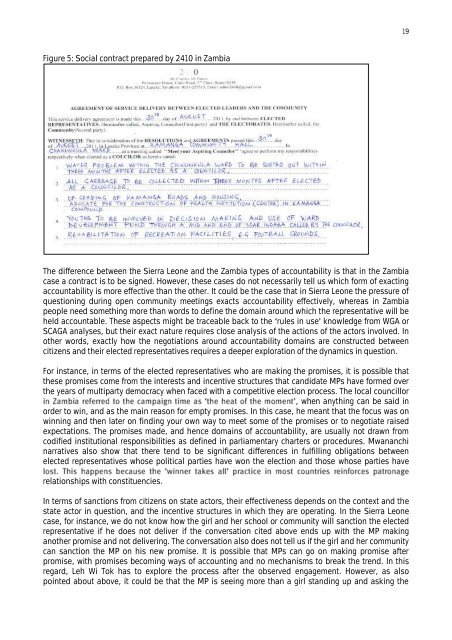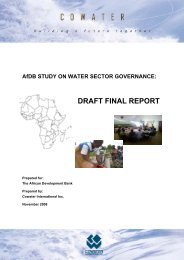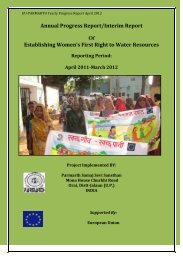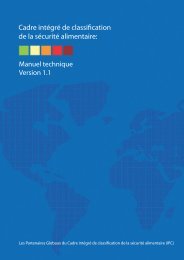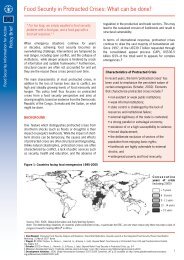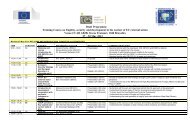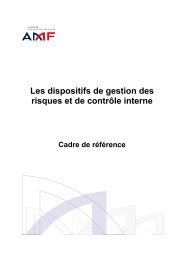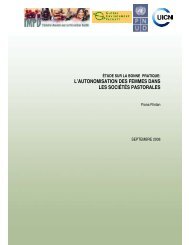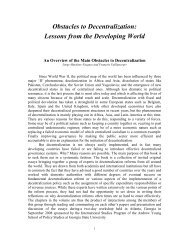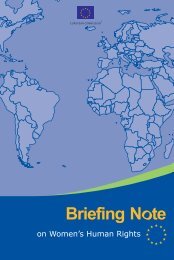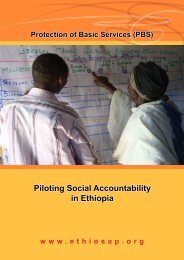19Figure 5: Social contract prepared by 2410 in ZambiaThe difference between the Sierra Leone <strong>and</strong> the Zambia types of <strong>accountability</strong> is that in the Zambiacase a contract is to be signed. However, these cases do not necessarily tell us which form of exacting<strong>accountability</strong> is more effective than the other. It could be the case that in Sierra Leone the pressure ofquestioning during open community meetings exacts <strong>accountability</strong> effectively, whereas in Zambiapeople need something more than words to define the domain around which the representative will beheld accountable. These aspects might be traceable back to the rules in use knowledge from WGA orSCAGA analyses, but their exact nature requires close analysis of the actions of the actors involved. Inother words, exactly how the negotiations around <strong>accountability</strong> domains are constructed betweencitizens <strong>and</strong> their elected representatives requires a deeper exploration of the dynamics in question.For instance, in terms of the elected representatives who are making the promises, it is possible thatthese promises come from the interests <strong>and</strong> incentive structures that c<strong>and</strong>idate MPs have formed overthe years of multiparty democracy when faced with a competitive election process. The local councillor, when anything can be said inorder to win, <strong>and</strong> as the main reason for empty promises. In this case, he meant that the focus was onwinning <strong>and</strong> then later on finding your own way to meet some of the promises or to negotiate raisedexpectations. The promises made, <strong>and</strong> hence domains of <strong>accountability</strong>, are usually not drawn fromcodified institutional responsibilities as defined in parliamentary charters or procedures. Mwananchinarratives also show that there tend to be significant differences in fulfilling obligations betweenelected representatives whose political parties have won the election <strong>and</strong> those whose parties haverelationships with constituencies.In terms of sanctions from citizens on <strong>state</strong> actors, their effectiveness depends on the context <strong>and</strong> the<strong>state</strong> actor in question, <strong>and</strong> the incentive structures in which they are operating. In the Sierra Leonecase, for instance, we do not know how the girl <strong>and</strong> her school or community will sanction the electedrepresentative if he does not deliver if the conversation cited above ends up with the MP makinganother promise <strong>and</strong> not delivering. The conversation also does not tell us if the girl <strong>and</strong> her communitycan sanction the MP on his new promise. It is possible that MPs can go on making promise afterpromise, with promises becoming ways of accounting <strong>and</strong> no mechanisms to break the trend. In thisregard, Leh Wi Tok has to explore the process after the observed engagement. However, as alsopointed about above, it could be that the MP is seeing more than a girl st<strong>and</strong>ing up <strong>and</strong> asking the
20question, <strong>and</strong> rather the relations she has <strong>and</strong> the powers <strong>and</strong> authority beyond her; that imagined oright be effective in sanctioning performance.Similarly, in the case of social contract signing, as in the Zambia case, it is important to follow throughon how local councillors interpret the social contract <strong>and</strong> actually abide by it. Contracts will likely senda stronger signal of the need for <strong>accountability</strong> but, depending on the way the rules of the game areh<strong>and</strong>led (see WGA or SCAGA analysis), might not guarantee <strong>accountability</strong>. The project could alsoexplore how to make these social contracts legally binding, which might make them stronger than theyare at the moment because they would then enable legal <strong>accountability</strong>. 28 However, the actualeffectiveness of social contracts of this nature in delivering <strong>accountability</strong> is dependent on how thejudiciary works <strong>and</strong> the ability of ordinary citizens to access justice as well as to be credible in the faceof a justice system that might itself be vulnerable to elite control. In some contexts, the nature ofclientelistic relations suggests that it is informal social pressure, rather than access to formal justicemechanisms, that is effective in exacting <strong>accountability</strong>.The nature <strong>and</strong> effectiveness of sanctions also comes through in the youths <strong>and</strong> mining case, also inBox 1. In this case, the youths were said to be very angry that mining companies were bringing peoplefrom outside to work. The MP s response to these dem<strong>and</strong>s could be regarded as better than that in thecase of the girl above because, in this case, he makes reference to policy <strong>and</strong> commits to having itchanged. Reference to laws <strong>and</strong> policy is often regarded as a better basis for engagement because itsets the st<strong>and</strong>ards based on the established rules of the game. As discussed above, promises linked tolegal frameworks might be stronger than those that are just personal gestures of the public officea capacity to play the role of alegislature <strong>and</strong> oversight on laws. However, we cannot really draw firm conclusions on any of theseissues unless we delve into the incentives <strong>and</strong> interests of the actors involved in the action.Similarly, on the side of citizens, we do not know exactly how the anger of the youths in the cited casestudy was expressed, <strong>and</strong> which youths were involved. These questions are important to explorebecause, within an entrenched economic activity such as mining, there are likely to be some youthswho have been benefiting from some forms of relationship with both mining brokers <strong>and</strong> governmentactors. These incentives <strong>and</strong> pra, <strong>and</strong> how it issustained beyond this meeting in order for change to happen. In terms of the MP s response, we needalsowhether there wereother incentives. The MP may have said what he said because it sounded good, but in real sense hisinterests may be more aligned with those of the mining industry than with those of the youths. TheCV&A programme therefore puts a strong emphasis on underst<strong>and</strong>ing incentives <strong>and</strong> mapping interestsas follow-up actions on the various forms of citizen <strong>state</strong> actor engagement.Therefore, in order to establish the pathway of change, it is also important to focus on the mechanisms<strong>and</strong> spaces CSOs are helping to create in order to enable citizens to exact <strong>accountability</strong> from <strong>state</strong>actors, as observed in Section 3.1. The analysis can then focus on the interests <strong>and</strong> incentives thatseem to be in play in these engagement mechanisms or spaces.3.2.2 Working with mechanisms <strong>and</strong> incentives for <strong>accountability</strong> to happenWhat seems to emerging from our analysis of mechanisms <strong>and</strong> incentives is that, in situations wherean issue is either contested or not well agreed among various stakeholders, CSOs use mechanismswhereby citizens are organised away from <strong>state</strong> actors or system <strong>and</strong> then gradually draw in the <strong>state</strong>actors concerned. The hope is that the results from organising outside the official process will becomeundeniable evidence of what the community needs, <strong>and</strong> hence incentivise positive governmentresponses. There are many situations where Mwananchi grantees are using this mechanism to facilitatecitizen dem<strong>and</strong> for government <strong>accountability</strong> <strong>and</strong> responsiveness. What matters in this case is theprovisto demonstrate results in the28Legal <strong>accountability</strong>Peruzzotti <strong>and</strong> Smulovitz 2006: 5-6).


